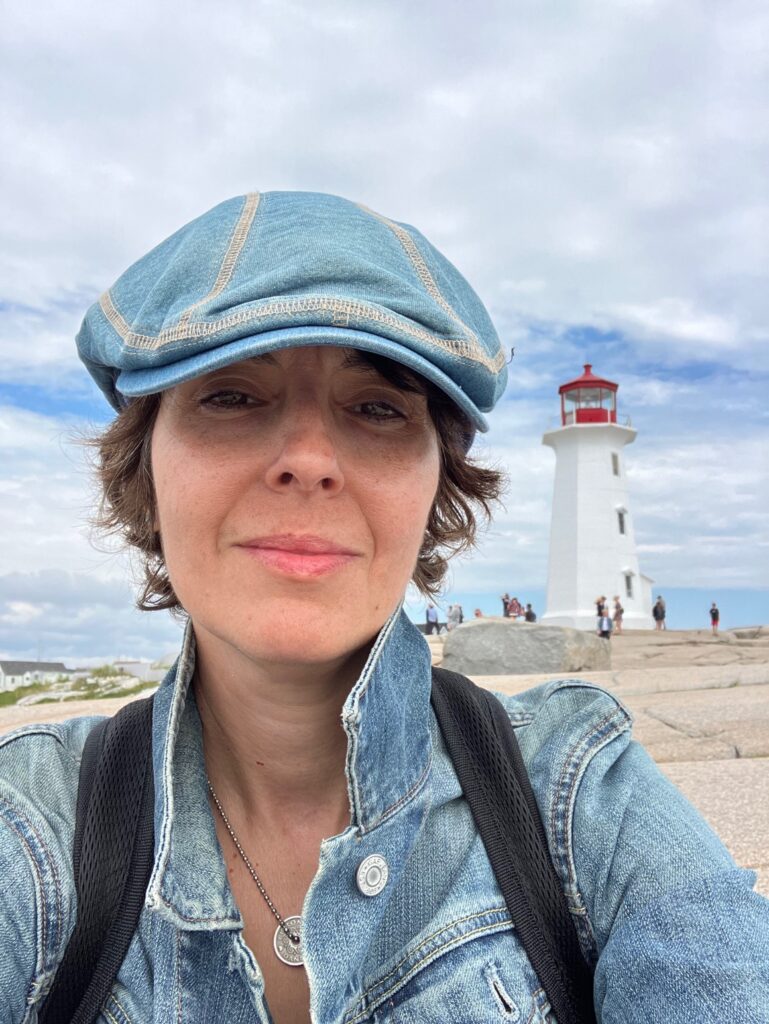By Mackenzie Kwok
What inspired Portuguese School: Stories?
Let’s see, so many things: Growing up a buck-toothed “dork” playing air guitar to AM radio while my mother boiled bacalhau or sautéed chicken gizzards for dinner in the kitchen and everyone else’s mom was making meatloaf and carrots. Being bi-cultural and not always knowing how to navigate that. Realizing early I didn’t fit the gender-conforming “norm” expected of either culture, especially at that time. And hoping nonetheless maybe there was a cool kid hiding somewhere in all that. Being Portuguese-American, product of immigrant parents and grandparents, and LGBTQ+ coming up and out in the 70s-90s, I’ve always considered myself a poet, but actually started my writing career by writing stories and essays about being queer—to come out as Portuguese-American—and being Portuguese-American to come out as queer. (There are more parallels than you’d think.) This was long before everyone wanted to visit Portugal. Now thanks to social media, influencers, and the work of many artists, writers, and ordinary folks in the Portuguese-American community, everyone and their mother wants to travel to Portugal or retire there. But back in the 90s, when I started writing about my experiences growing up, it was a different story. Most non-Portuguese people I encountered couldn’t find Portugal on the map or confused it with other countries. As wonderful (and historically thorny) as the culture is, growing up as a queer kid under it was not idyllic. But there were definitely moments that inspired these stories as a way for me to reflect, laugh, heal and share. And even though these stories are set in a particular time period, I think they are still definitely relatable to many people of various backgrounds.
What are you currently working on?
Thankfully, so many things! I’m proofing my full-length poetry collection, Passaic, due to be published later this year by Get Fresh Books. I’m continuing to tinker with Portuguese School, of course. My film partner, Boris Tsessarsky and I (at Parkway North Productions) are wrapping up shooting for our latest documentary about polyamory and family and hope to start post-production this fall. Our last documentary, The Remedy, is streaming online and I’m happy to see its audiences growing. And I’ve personally got a short video piece called Regina that expands a bit on some peripheral themes of The Remedy and will be part of the 2024 NJ Arts Annual exhibit (running from September 2024 to January 2025 at the Montclair Museum of Art). There are other projects in the hopper, but these are the main ones that are keeping me busy this summer. I’m trying to get a lot done before going back to teaching in the fall!
How does queerness show up in your work? What do you learn about queerness and gender through writing?
Queerness shows up when my characters resist conformity or upend expectations, even, or especially, in mundane circumstances, by using humor, whether subtle, slapstick or situational. I’m a big fan, for instance, of Southern writing that uses the “smartass.” A smartass doesn’t have to be an extreme rebel with a certain look. They can “pass” visually as part of the majority, but something about their attitude is just “queer” enough for them to get in zingers and make a point, keeping in mind of course their time and place in history. Of course, sometimes they also do look “queer,” can’t hide it, and so their response to non-acceptance or threat is going to be different. As far as gender—look, I’m a middle-aged, short, olive-skinned, Roman-nosed, previously dark-brown (previously, cause it’s graying like a thundercloud) wavy-haired girl/woman who is a 14-year-old (ok, sometimes 17-year-old) boy at heart. I am and have always been gender (and age) non-conforming, whether I look it or not. I suspect most people are. But our society and economy are built on not allowing people to be at ease about that. Sometimes, I’m someone’s girlfriend, and sometimes their boyfriend. Regardless of what my spirit is, I am always cognizant of how political being in a female body is. Writing and art allow me to be who I am no matter who is micro-aggressing, passing restrictive laws, or banning books. That being said, I hope you all read mine!
What do you hope readers take away from your work?
It’s ok to laugh, indulge in nostalgia, and not revise history to fit contemporary standards—but see what was as a comment on how far we have or haven’t come since, even if it’s through the lens of a particular culture.
Do you have anything exciting coming up you’d like to share?
I think what’s coming up is a culmination of so many decades of work, that what I’m currently working on is really more like what I have been working on my whole life. My mother, when she was alive, was always asking about my projects: “You get any money for that?” Now that I actually have gotten some money for “that,” I wish she was around. I wonder what smartass comment she’d make. (You see where I get a lot of my inspiration). I saw how she, my father, and my grandparents—all creative people, all immigrants fleeing poverty and the lack of formal education that was part of life under Portugal’s Salazar dictatorship—deferred their dreams, literally, in order to survive in Newark, NJ. In a weird, contrarian way, deciding to follow my heart has actually been tribute to all their sacrifices, sacrifices which I’m humbled by and grateful for every day. And I’m also humbled by and grateful for the support of Mid Atlantic Arts and the NJ State Council on the Arts for giving me, and so many artists, the means for some time and space to create.
Follow paulA neves on Instagram at @itinerantmuse, or on their website at paulaneves.net
